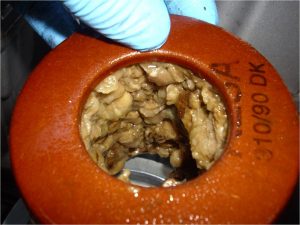
Blocked Biodiesel filter
Biodiesel is already proving to be problematic with the Fatty Acid Methyl Esters, or FAME, being far more susceptible to microbial attack. FAME can stick to metal surfaces, such as in pipelines and tankers. When it does it can then be drawn out in other fuels passing through or being carried, thereby adding FAME to non-FAME fuels like diesel or increasing the percentage of FAME in other biofuels. There is hearsay evidence that the presence of FAME in fuels increases speed with which contamination grows to be a problem.
There is some concern that the introduction of FAME in diesel could change the profile of microbes, with new species adapting to live off the new material. For example, whilst Hormoconis resinae remains the dominant microbe in diesel, there is evidence that some yeasts proliferate in these new fuels.
The recent widespread use and acceptance of bio-diesel has increased reports of contamination in civilian marine vessels and land-based diesel issues around the world, including Singapore, the UK and New Zealand.